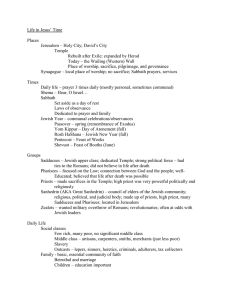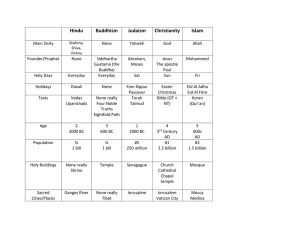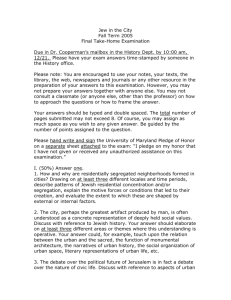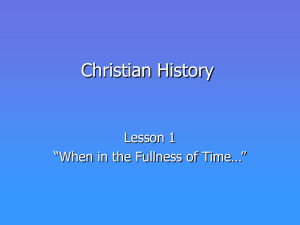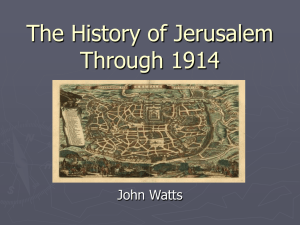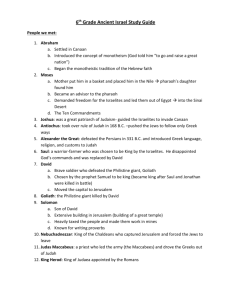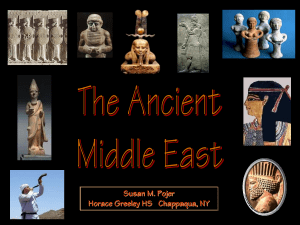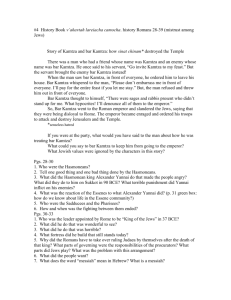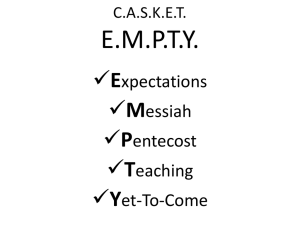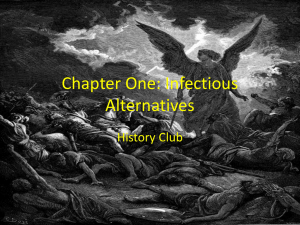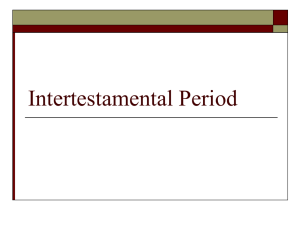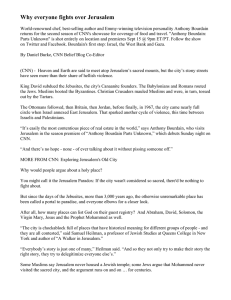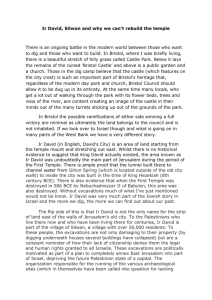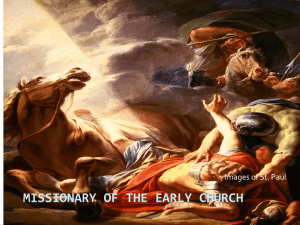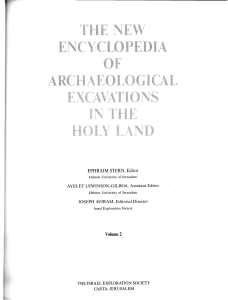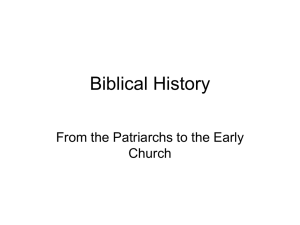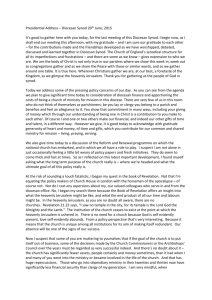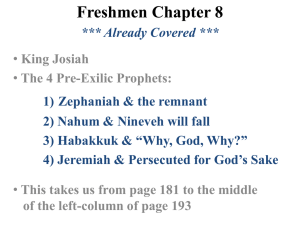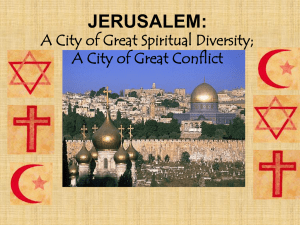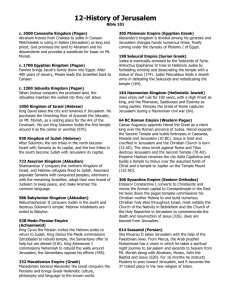01-Early-Church-Legacy
advertisement
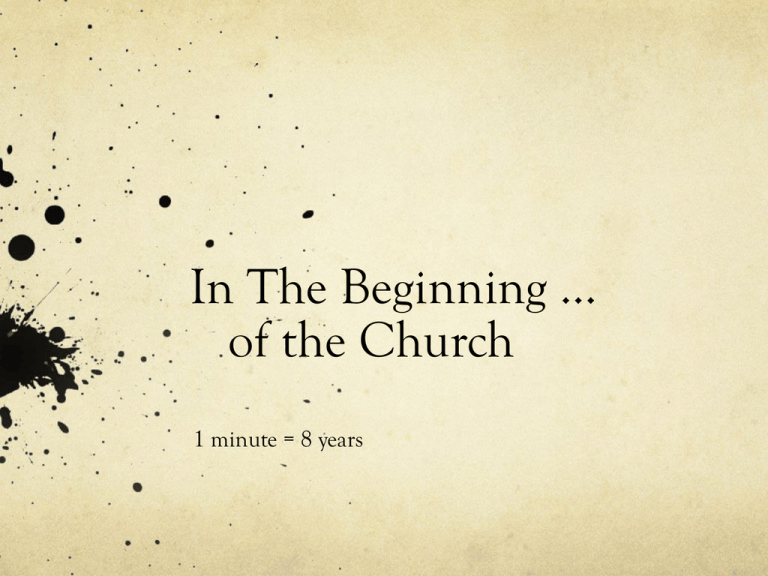
In The Beginning … of the Church 1 minute = 8 years Filling in the Gap Persia (539-330BC) High Priest – local ruler Judea limited freedom Descent through mother Synagogues Alexander (330-323BC) Hellenism (koine) Still limited freedom Ptolemies & Seleucids Hellenism (optional) Still limited freedom Maccabees & Hasmonean Period Antiochus IV ‘Epiphanes’ (175BC) Forced Hellenization Judah Maccabee ‘the Hammer’ Jerusalem 164BC – Hanukkak Hasmoneans – Independence Monotheism finally, forever Purity, law newly emphasized Hasmonean civil war 63BC Pompey, later Caesar (Roman) Jewish Political/Religious Parties Pharisees Laymen, not priests (Saul/Paul) Resurrection Predestination & Free will compatible Letter of the Law, not the Spirit Sadducees Temple priests Free will No afterlife/resurrection (Dan 12:2; Acts 23:8) Torah only (1st 5 books) Essenes Predestination Communal, silent meals DO NOT GO TO TEMPLE Herod the Great Governor of Galilee (47-40BC) NOT Hasmonean Parthian invasion (40BC) Flees to Rome Made ‘King of the Jews’ (40-4BC) By decree of Roman Senate Married Hasmonean princess Recaptured Jerusalem (37BC) Upgraded Temple Built pagan temples, too Gen 49:10-11; Num 24:17; Isa 11:1-9 Guess who crashes this party? Now after Jesus was born in Bethlehem of Judea in the days of Herod the king, magi from the east arrived in Jerusalem, saying, “Where is He who has been born King of the Jews? For we saw his star in the east and have come to worship Him.” When Herod the king heard this, he was troubled, and all Jerusalem with him. Matt 2:2-3 (NASB) A th 4 Jewish Sect? Resurrection (Sorry, Sadducees) “The Way” a Jewish Sect Attended Temple Followed rituals Observed dietary laws Spread the Gospel (Acts 13:15-16) What of “God Fearers”? Jerusalem Council (49-50AD) Acts 15:1-30; Amos 9:11-12 Destruction of Jerusalem (70AD) Church now Gentile Pilgrim Church Greek philosophies Justin Martyr and Origen Order, justice, and beauty Pax Romana (27BC-180AD) Ideal for spread of Gospel Roman theological pluralism Emperor Domitian (81-96) Dominus et Deus “Lord and God” Anti-Christian pogroms begin How did Ignatius of Antioch face martyrdom? “I hope to obtain by your prayers, the privilege of fighting with the beasts at Rome. Suffer me to be eaten by the beasts, that I may be found the pure bread of Christ. Entice the wild beasts that they may become my tomb, and leave no trace of my body. Then shall I truly be a disciple of Jesus Christ, when the world shall not even see my body.” ©Witnesses impressed with Christian steadfastness ©Some Romans converted BECAUSE of martyr courage ©Stories of martyrdom actually used to encourage Christians Emperor Constantine (306-337AD) Worshiper of Sol Invictus Battle at the Milvian Bridge (312) Dreams “Chi Rho” “In this sign, you will conquer” Edict of Milan (313) Christianity “legal” now Slippery slope? From Pilgrim to Imperial Church Sunday made holy day (321) 1st Council of Nicaea (325) Nicene Creed December 25th celebrated Jesus’ birth Was Sol Victus’ festival day Eusebius, a bishop in Palestine Writes 1st church history Writes Constantine bio “13th apostle” Edict of Thessalonica (380) Christianity only legal religion Shifts in Focus Early Church Jewish - mixed Synagogues – caves Long suffering End Times focused Imperial Church Gentile Churches (Constantine’s mother) Accepted & in power “White Martyrdom” Monastic separation Mix of this world & next Next time … The Medieval Mind: Fusion and Order
